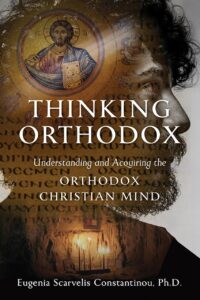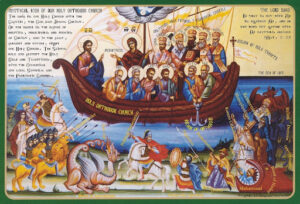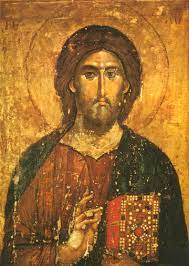
Somewhere not long ago I read a review which said that all Orthodox Bloggers should be required to read the book THINKING ORTHODOX: Understanding and Acquiring the Orthodox Christian Mind, by Dr. Eugenia Scarvelis Constantinou.
So I decided to do just that, and I am very glad I did.
This excellent book precisely describes the Orthodox mindset (what she calls the Orthodox “phronema” – we’ll come back to that) and conveys, better than anything I’ve ever read, how that mindset comes to us directly from Jesus Christ. You scholarly souls, don’t be “put off” by her simple, understandable language. This book will take you deep.
It has helped me understand what I’ve long known about Orthodoxy, but hadn’t words to describe it. As I moved towards the Orthodox Church almost forty years ago I sensed that this was not like anything I had ever known, different in kind from Western Christianity, even though we often share the same words. When I became Orthodox I quickly knew that I was “somewhere else” entirely: in a Church which was completely and uniquely grounded in Jesus Christ, the Scriptures and the Fathers, solid in the Catholic and Apostolic Faith, a Church which (despite herself sometimes) has sailed over all the struggles and heresies thrown against her.

from “Orthodox Australia”
And yet there was a perceptible feeling of freedom within Orthodoxy. Yes, we have heirarchs to step in to deal with practical problems, as they may or may not do. But regarding doctrine and practice, unlike Western Christianity, the Orthodox Church has no external “control system” – no Pope or Magisterium or KIng or Queen of England or Calvin’s Institutes or Formula of Concord or Thirty-Nine Articles or contemporary preacher to tell us what to believe or how to pray. Orthodoxy doesn’t need any of that.
So what is it that has held the Orthodox Church firm in the Faith? or to put it another way, what has kept us Orthodox Orthodox? I couldn’t figure it out. For these many years I tried without success to understand.
Now I think I know.
Dr. Eugenia says it lies in the Orthodox phronema / φρόνημα. Do you know the word? I am embarrassed to say that I did not. The Orthodox phronema is basically our “mentality”, our built-in way of thinking which has come down to us directly from Jesus Christ and the Apostles, which then affects our existing and living. The Orthodox phronema is so distinct from that of Western Christianity that neither Protestants nor Roman Catholics can grasp it. Nor ultimately can we Orthodox describe it, for it does not consist of definitions or clear rational explanations. It is… oh, just read the Book!
It is published by Ancient Faith Ministries, and can be purchased from their bookstore. Or try Amazon, where you can also get the Kindle version.
 Here is what I’m leading up to: The Conclusion of Thinking Orthodox gives 1 an excellent description of the Orthodox phronema, and of how it is grounded in the phronema of our Lord Jesus Christ; 2 the best description I have ever found of the Person, Life and Ministry of Christ. When I first read it my reaction was “Wow!”
Here is what I’m leading up to: The Conclusion of Thinking Orthodox gives 1 an excellent description of the Orthodox phronema, and of how it is grounded in the phronema of our Lord Jesus Christ; 2 the best description I have ever found of the Person, Life and Ministry of Christ. When I first read it my reaction was “Wow!”
Icon by permission of Saint Isaac’s Skete at skete.com
So I emailed Dr Jeannie and asked permission to include the Conclusion of her book in my Blog. Her immediate response was “Oh my goodness, of course you may!” – and in the process of several emails that morning I also discovered what a charming person she is. This is printed also with the permission of Ancient Faith Ministries.
You know that I love using images in my Blog. In what follows I will not include any. My writing needs illustrations to support it. Hers does not.
THINKING ORTHODOX
Conclusion – Part One
Jesus Christ and Orthodox Phronema
Our phronema is our mindset, but mental attitude can never be separated from our behavior. Our phronema is revealed by our manner of life. Conversely, the way we choose to live shapes and reinforces our phronema.
The Gospel of John begins by describing the Son of God with the word Logos. “In the beginning was the Logos”, or “Word”. 1 John’s choice of Logos to describe the eternal Son of God is powerful and profound. Logos in the Greek language means so much more than simply “word”. It also stands for speech, thought, reason, logic, reckoning, explanation, narrative, sermon, verbal expression, subject, cause, and order. It was the word that ancient Greeks used to express the unknown dynamism that ordered and sustained the universe.
1 The importance of this passage in Orthodox Christianity is shown in the fact that we read this Gospel at the Divine Liturgy of Pascha as we celebrate the Feast of Feasts, the Resurrection of our Lord Jesus Christ. Our lectionaty cycle begins with this Gospel reading, revelaing its preeminent theological importance.
By choosing the multifaceted word Logos, the Evangelist expressed that Jesus Christ reveals the Person and mind of God the Father. He is the fount of all truth, reason and thought. Saint John succinctly articulated the purpose of the Incarnation of Christ to make God known to us, to mediate to us the eternal, omnipotent, uncircumscribed, uncontainable, invisible, ineffable, inexpressible, inconceivable, incomprehensible God. Jesus identified Himself by using the divine name: I AM. It is not the “name” of God in the usual human sense but a profound expression of what God, beyond all human comprehension or expression, truly is.
Because God is Life and Being Itself, an intimate relationship with God is not only only possible; it is our calling. In fact, we were created for that singular purpose: to have a relationship and eternal life with God. This is not simply a future goal but a process that begins in this life and can even be experienced in this life The Kingdom of God is present here and now, but the extent to which we participate in the life of the All-Holy Trinity depends on us.
But how could we ever relate to God or, even more challenging, be truly united with Him? Of all religions, only Orthodox theology emphasizes union with God – in a real and actual sense – as the goal and purpose of all human life. We rarely speak of “going to heaven”, as though it were a destination. We do not speak of experiencing a “beatific vision” of God, as though God could be visited but remained at some distance from us. Rather Orthodox Christianity speaks of theosis, the divinization of the human person. We expect, hope and strive for actual union with the perfect, infinite, eternal, omnipresent, and changeless God. But we are flawed, limited, and come into existence for a brief time; we are confined to one place at one time, and we are constantly changing. So how is union with God possible? The Incarnation, the enfleshment of the Son of God, gave us the ability to truly connect to God and become united with Him, transformed and illumined by Him, not simply because He died for us but because of the way He lived among us.
The apostles did not study theories, formulas, or theological methods. They experienced the Incarnate Son of God – God Himself, since the Son is fully God. They observed his phronema, and they learned to live it themselves. The uniqueness of Orthodox Christianity is its emphasis on a complete integration of mind and behavior in the same manner that was known and lived in the early Church. This is not something new to us. We did not rediscover something that had been lost. We never needed to correct what was missing by experiencing a reformation. We did not come to this understanding or adopt these prayers, practices, or lifestyle by trying to recreate the early Church through study of the Scriptures. We have always lived and believed this way because we have preserved the way of life and way of thought of the apostles – their phronema. They passionately preserved the teachings of Christ, and we passionately preserve what they taught us. This is not merely a set of ideas, beliefs, concepts or doctrines about Christ, but an actual means of acqiuring the mind of Christ and achieving the inner transformation to which we all aspire.
Orthodox Christians follow in the footsteps of millions of Orthodox Christians who came before us, especially the attitude and lifestyle of the saint, because they achieved holiness In order to follow their path to the Kingdom of heaven, we do as they do, and we aspire to think as they thought. This is why the saints are important and cherished. This is why the ancient prayers and divine serives are important – they express the apostolic faith and phronema. This is why the Scriptures are important – they express the apostolic faith and phronema. The Fathers of the Church provide us with the proper and ancient understanding of those Scriptures. For this reason, the sacraments are important, and not only the Holy Mysteries. Everything we do in the Church, everything we receive in the Church, is imbued with the grace of the Holy Spirit, who activates the life in Christ, not only impelling us forward toward our goal but beginning the process of spiritual healing and transformation here and now in this life.
Salvation requires tremendous effort on our part. Christ did His part and opened the gates of Paradise to us by His death and Resurrection. But He spoke about the “narrow gate” and warned us that the path would be difficult, and few would find it. (Matt. 7:13) He cautioned us through the parable of the sower that most of the seeds sown would not produce a harvest (Matt. 13:1-23; Mark 4:3-20; Luke 8:5-15). We cannot be complacent. It is not enough to simply accept that Jesus saved us and dedicate ourselves to Him. There are no “merits” to acquire, no extra grace from Mary, Jesus, or the saints that we can appropriate for ourselves. We never believe we can earn our salvation, and yet we are solely responsible for our individual salvation. God has already done everything necessary for our salvation and “desires all men to be saved and to come to the knowledge of the truth” (I Tim. 2:4).
Western Christianity has a wide variety of spiritual practices and traditions, many of them ancient and beautiful. However, Orthodoxy is distinctive in its persistent emphasis on the image of God within each of us. All of us carry the indelible image of God, which is our potential to become godlike. However, it is our responsibility to acquire God’s likeness by the help of the grace of God, by responding to that grace and exerting our own efforts. As Christ is the icon of the Father (Col. l:15), we are all called to become icons of Christ. We are invited to imitate Him – not simply to believe in Him or learn about Him, but to become like Him, to imitate His phronema. He said, “I am the way, and the truth, and the life” (John 14:6). He showed us the Way, taught us the Truth, and gave us Life. He is our example in every aspect of our lives. He spoke to us about God the Father and the Holy Spirit and conveyed God to us in a myriad of ways during His earthly ministry, including in unspoken ways by His entire demeanor – His phronema.
The life of the Lord provides a model for our behavior in general and also for the way we ought to teach and talk about God. All of us who identify ourselves as Christians ought to convey Christ to others by our words and behavior. What can we learn about the Lord’s phronema from the Gospels?
Next Week: Thinking Orthodox, Part Two – Please come back to read Dr Constantinou’s remarkable description of the source of the Orthodox phronema: The Phronema of Our Lord Jesus Christ.
Week after Next: Saint Simeon the Stylite and other peculiar people
Thank you, thank you Fr. Bill for this posting! Our women’s group began reading this book a few months ago, meeting once a week. As you know, you don’t read this book quickly, there’s too much to absorb and think about, so we’re still at it. : )
The book, indeed, is a must for every Orthodox! I usually read ahead in this book because it is so fascinating, but I have had to slow down and reread so many parts. There is so much to take in that it requires slow reading or at least reread as necessary. The conclusion seems so apt, so appropriate to give a kind of summation of what the book does.
One can see and hear Pres. Jeanne Constantinou talk about the book and answer questions in a 4-part series on OCN – Orthodox Christian Network, it’s in their “Let’s Talk Live” section: myocn.net
May this book be a blessing to tens of thousands of folks.
An interesting fact I learned is that a priest has to get permission from his bishop to preach if he, the priest had not received theological education in a school/seminary.
Thank you for your many helpful, delightful, and informative blogs
Yvonne Juliana
Thank you very much. And thanks for the information; I didn’t know about Dr Jeanne’s OCN series. She is now hoping to write another book, though I can’t imagine how she could find the time.